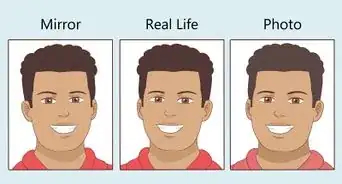This article was co-authored by Trudi Griffin, LPC, MS. Trudi Griffin is a Licensed Professional Counselor in Wisconsin specializing in Addictions and Mental Health. She provides therapy to people who struggle with addictions, mental health, and trauma in community health settings and private practice. She received her MS in Clinical Mental Health Counseling from Marquette University in 2011.
There are 10 references cited in this article, which can be found at the bottom of the page.
This article has been viewed 55,270 times.
Self-consciousness can come in many forms and affect many areas of life. When you are feeling self-conscious about your weight or your body, you may want to hide beneath your clothes or not go out as much. Surprisingly, not just girls feel self-conscious about their bodies, some guys do, too. In fact, people of every shape and size may have body confidence issues, even if they aren't overweight. There are things you can do to deal with self-consciousness and start accepting and loving your body just the way it is.
Steps
Challenging Self-Consciousness
-
1Remind yourself that self-consciousness is a feeling not a fact. When you feel self-conscious it seems like a spotlight has been turned on you. Every aspect of yourself seems to be on display for others, primarily the flaws. Know that this is just a feeling within you. The majority of the time, people are too wrapped up in themselves to be overly concerned about you.
- When you feel yourself getting very self-conscious about your body, instead of keeping these feelings in, express them. Tell a friend or close sibling how you are feeling. That way you can get a true opinion outside of yourself.
-
2Figure out the source of your self-consciousness. In order to make strides against overcoming self-consciousness, you need to uncover its roots. Were you teased as a child about your weight? Is there a certain person who always makes you feel self-conscious? Does your mom or dad constantly tell you how you need to lose weight?Advertisement
-
3Deal with the people who make you self-conscious about your weight. If your self-consciousness stems from the judgments of others, then the solution can take one of two forms. You will have to look deep inside yourself to determine if your relationship with this person is worth the pain they are causing you through judgments or unkind remarks.
- If this person is a distant friend or acquaintance whose insults are making you feel bad about yourself, then it may be necessary to sever ties with this person. You deserve to have supporting relationships, not ones that tear you down.
- If the person casting judgments about your weight is a really close friend or family member, you need to confront them. This person needs to be aware of how their remarks are affecting you. Once you confront the person, they may recognize the harmfulness of their words and no longer insult or judge you.
- If you decide to confront the person, you should give them a heads up that you want to talk and choose a neutral location to meet. Use "I" statements and avoid blaming them. Just let out your feelings with facts. A statement might sound like "I feel upset/sad/embarrassed when you make comments about my weight. I would really appreciate it if you could stop doing this."
-
4Ask yourself if others are really judging you. If your attempt to identify the source of your self-consciousness came up empty-handed, it may be because these feelings are more ingrained. Perhaps you lack confidence in your body because of messages expressed in the media. Maybe your body size and shape does not resemble models or TV actresses and it causes you to feel bad about yourself. Maybe you've tried to lose weight and failed in the past, so now you are beating yourself up mentally and emotionally.[1]
- It's time to get real with yourself about media messages. Both women and men idealize the unattainable bodies that are portrayed on TV and magazines when these bodies have been photo-shopped to look perfect. Tell yourself that real bodies come in all shapes and sizes. Look around you; each day you see a range of beautiful people with all sorts of bodies.[2]
Accepting Yourself As You Are
-
1Learn to accept yourself as you are now. Even if you are overweight, your body is still an amazing thing. Your heart never stops beating. Your brain is a super-computer. Your eyes allow you to see the wonders of life and your environment. You have so much to be grateful for if you are able to see, hear, smell, move, and think for yourself. Practice a few body-loving exercises to learn to accept your body as it is.
- As you rise from your bed each morning, wonder at the strength and perseverance of your body. Your legs carry you around. Your arms tie your shoes and hold objects. Your nose can catch the scent of fresh-brewed coffee. Isn't your body a miracle?
- Stand in front of the mirror and think positively about what you see before you. Before you step into the shower or change clothes, stand naked or in your underwear and admire your miraculous body. Recite this: “I fully accept and love myself right now just the way I am. I’m grateful for my wonderful body and for the gift of life.”
-
2Challenge negative thoughts. If, during the course of these exercises, negative thoughts enter your mind, don't entertain them. Instead, reflect upon how awesome your body is.
- Reframing means changing your negative perspective into a positive one. It takes practice but once you are able to identify which thoughts are unhelpful or negative (Hint: Those that make you feel bad.), you can tear this self-talk apart and reframe it.
- For example, you might say: "I look terrible in this outfit. Everyone will laugh at me." While reframing, ask yourself has there ever been a time when everyone laughed at you. If the answer is no, you can reframe this statement to say "Everyone has a different idea of style. I like this outfit and that is what's most important." This reframing is not only more positive but also more realistic.
-
3Reevaluate your beliefs. Sometimes, we feel bad about ourselves because we are holding on to ingrained beliefs about what we should or should not be. An example of an ingrained belief is, "In order to be attractive, I have to be thin." Know that it's OK to release beliefs that no longer serve you.[3]
- Ask yourself how you would respond if you found out a dear friend was attacking her/his body. You would probably tell them how beautiful they are. You would point out all their strengths and tell them they have so much going for themselves.
- Tell yourself these things when you notice yourself falling prey to negative beliefs or attitudes about your body. Say things like "I am smart. I have gorgeous skin. I rocked that dress last night."
-
4Determine if there is a deeper problem. If you are persistently encountering problems with your self-esteem or your negative body image causes you to practice extreme dieting or refusing to eat, you should see a therapist who has experience with body image and eating disorders. A mental health therapist in this area may help you to apply cognitive and behavioral techniques that help you modify the negative thoughts you have about your body and develop healthier habits.[4] [5]
- Another option for you to work on your self-confidence is to attend a body image group. Your therapist may be able to refer you to a local group or the professional may have a group that he or she meets with regularly. Such a group can help you to connect with others who are going through similar body image struggles, and allow you to find courage to overcome these issues with support.
Taking Action
-
1Throw away the scales. This may seem counter-intuitive, but a surefire way to stop obsessing and feeling bad over your weight is to get rid of your scale. As it turns out, the scale is only one - and not the most reliable - way to measure your progress. Plus, if you are climbing on the scale every morning and beating yourself up because the number stays the same or climbs, it's probably causing you more trouble than it's worth.[6]
- Weight can be misleading, as 150 pounds will look totally different on a person who is 5'2" than it will on a person who is 5'7".
- Instead of focusing on your weight, track your progress in more reliable way such as getting regular blood tests for blood sugar, blood pressure, and cholesterol. These numbers can give way more useful information about your health, and can also indicate disease if they are moving in the wrong direction.
- Visit a gym or fitness center and get your body composition taken. Such a measure can tell you if you are within a healthy range for body mass index (BMI) and if you have lost fat and gained muscle, two factors which often influence what you weight may be on the scale.
-
2Develop a clean eating plan. If you are feeling lousy about your weight, then following a healthy diet can help you feel more confident. This is one proven way you can take action against body self-consciousness. Strive to eat real, whole foods such as fruits, vegetables, whole grains, lean meats, seafood, seeds, nuts, and low-fat dairy. Avoid refined and processed foods that have been altered from their original form.
- Visit choosemyplate.gov to learn the recommendations for a balanced diet from the United States Department of Agriculture.[7]
- If you are interested in receiving personalized, one-on-one feedback about your diet in relation to your current BMI and lifestyle, see a registered dietitian.
-
3Stay active. The second most instrumental factor to becoming healthier is adopting a regular fitness program. This doesn't mean spending hours in the gym. A physical fitness program can include a range of activities you enjoy like volleyball, swimming, or dancing. Regardless of what you do, regular exercise helps you to burn calories, feel better about your physical appearance, gain more energy, and relieve stress.[8]
-
4Set goals for yourself. Goal-setting allows you to create a road map for your success. Defining our goals helps us to evaluate if our daily actions are moving us toward or away from them. Plus, achieving a goal gives you confidence and builds your self-esteem. If you are wanting to feel less self-conscious about your weight, you may strive to develop a weight loss or fitness goal such as eating more vegetables or doing a workout five days a week. Just make sure that your goals are S.M.A.R.T.[9]
- Specific. You set a specific goal by answering the w's. Who's involved? What do you want to accomplish? Where will the goal take place? When will it start/finish? Why are you doing this?
- Measurable. Good goal-setting includes tracking and measuring progress.
- Achievable. Yes, you want your goal to challenge you, but you also want it to be something you can reasonably achieve. For example, you wouldn't want to set a goal to lose an obscene amount of weight in a short period of time.
- Results-focused. S.M.A.R.T. goals focus on the outcome. You track your progress over time and see if you reached the goal in the end.
- Time-bound. Timeliness is also important in goal-setting. You want to set a time-frame that is practical but also not so far away that you lose focus.
-
5Dress and look your best. Another way to kick self-consciousness to the curb is to feel more confident in your looks. Visit your hairstylist to get a haircut or style that is most flattering to your face shape. Also, go through your wardrobe and examine each piece of clothing you own. Ask yourself if each piece makes you feel happy, confident, and attractive. Are you constantly tugging or pulling on certain pieces? If certain pieces don't make you feel great, toss them (or donate to Goodwill).[10]
- You may not have the cash to go out and pick up an entirely new wardrobe. Hold on to some things that you like, and as you get extra money, pick up new items that make you feel confident and like the person you want to be. You should smile at yourself in the mirror when you try these pieces on.
- Seek out a boutique or clothing store that offers tailored, sculpted pieces in high-quality fabrics. These pieces don't have to be expensive but only look and feel of good quality. Choosing well-made pieces can go a long way towards increasing your confidence and making your body look more flattering in your clothes.
References
- ↑ http://healthpsych.psy.vanderbilt.edu/2009/BodyImageMedia.htm
- ↑ http://info.umkc.edu/womenc/2012/06/29/keep-it-real-challenge-photoshops-impact-on-body-image/
- ↑ http://www.vpul.upenn.edu/caps/files/2012_Brochure_-_Body_Image.pdf
- ↑ https://www.gannett.cornell.edu/topics/nutrition/eating-bodyimage/
- ↑ http://www.byui.edu/counseling-center/self-help/eating-disorders/negative-body-image
- ↑ http://www.pinnaclehealth.org/wellness-library/blog-and-staywell/health-resources/article/24585
- ↑ http://www.choosemyplate.gov/
- ↑ https://www.k-state.edu/paccats/Contents/PA/PDF/Top%20Ten%20Reasons%20to%20Exercise%20and%20Be%20Physically%20Active.pdf
- ↑ http://www.hr.virginia.edu/uploads/documents/media/Writing_SMART_Goals.pdf
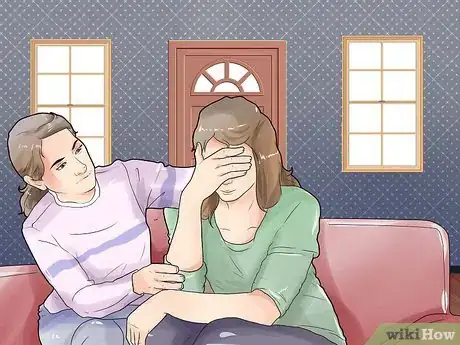
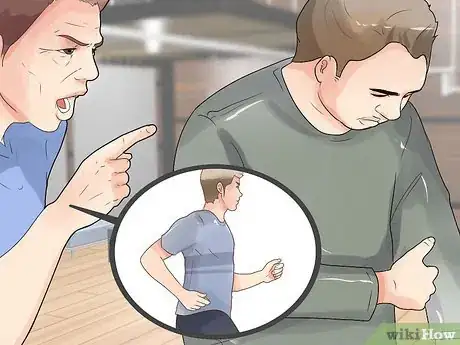




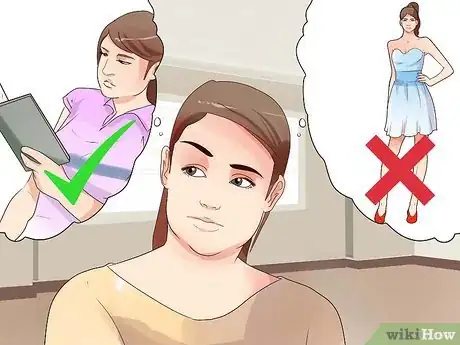





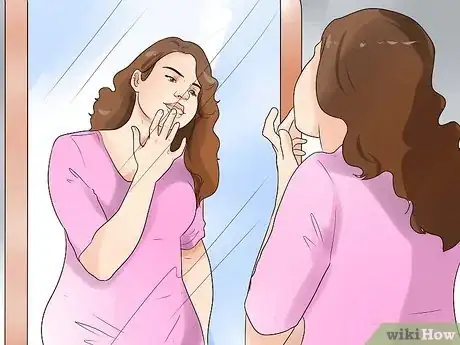





-Step-16-Version-2.webp)



